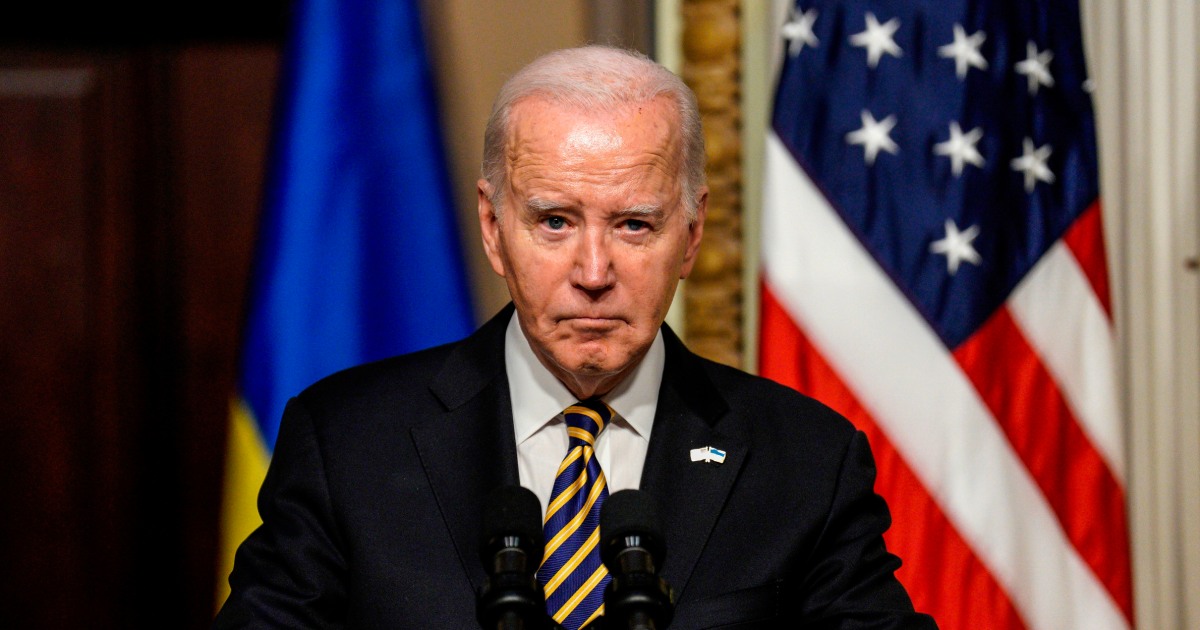
WASHINGTON — As pressure to rein in the Israeli military mounts, President Joe Biden this week seemed to signal that his patience is running out and that he won’t put up with an indefinite Israeli bombardment of Gaza that leaves the enclave in ruins.
Nations that have backed Israel in its war with Hamas are souring on the Jewish state over its “indiscriminate bombing,” Biden cautioned at a fundraising event Tuesday.
Tough as the words sounded, Biden’s actions are, if anything, bolstering Israel’s ability to carry out the war and reach its paramount goal of destroying Hamas.
He has yet to take measures that could alter the tactics of the Israeli military in ways that spare more civilian lives.
Biden hasn’t imposed conditions on the military aid that the U.S. sends to Israel, as members of his own party have urged him to do. Nor is he demanding a cease-fire or end date to a war that has displaced nearly the entire population of Gaza.
Successive votes in the U.N. General Assembly illustrate how Israel and the U.S. are more and more isolated in their opposition to a cease–fire.
On Tuesday, 153 countries voted in favor of a cease-fire, with 30 countries switching their position in favor since a similar measure was debated in October. Among the countries that changed their stance were three close U.S. allies: Australia, Canada and Japan.
The U.S. and Israel were among only 10 countries that opposed the resolution; 23 others abstained.
“There’s a full expectation that what was provided to them [Israel] will be used appropriately in accordance with the law of armed conflict, but we’re not at this time putting any additional strings on the assistance that we’re providing,” a senior Biden administration official said in an interview. That hands-off posture could become untenable for Biden amid accusations that Israel is inflicting needless suffering on Palestinians who cannot escape the shelling.
Despite the sharper language coming from the president, the administration four days ago invoked an emergency authority to bypass Congress and expedite the sale of tank ammunition to Israel. Secretary of State Antony Blinken concluded that “an emergency exists that requires the immediate sale” of the ammunition, worth $106.5 million, without congressional review. Congress is currently locked in a fight over U.S. border policy and aid to Ukraine that has stalled approval of assistance to Israel.
The move underscored Biden’s reluctance to deprive Israel of military assistance — or even try to enhance America’s leverage by threatening to do it. Biden showcased his unflinching support for Israel’s war aims in his address Tuesday at the fundraising event, though the point was easy to overlook as he laid out his differences with Israel’s far-right government over a peace plan for the region.
He likened Hamas to “animals” and vowed that he would not “walk away from providing Israel what they need to defend themselves and to finish the job against Hamas.”
Considering Biden’s address in its entirety, Aaron David Miller, a former senior State Department official who focused on Middle East policy, said: “It’s hard to imagine we’re going to go from where Biden has been in the last 67 days [since Hamas attacked Israel] to some fundamental departure where he’s going to pick up the phone at some point by year’s end and say to [Israeli Prime Minister Benjamin] Netanyahu: ‘Enough.’”
Biden is unique among modern presidents in his identification with Israel and the Zionist movement, he added.
“Biden has clearly refrained from bringing a moral symmetry to Israeli and Palestinian deaths,” said Miller, a senior fellow at the Carnegie Endowment for International Peace. “He clearly is much more empathetic on the Israeli side given who he is. The guy really does feel part of the Israeli narrative, the Israeli story.”
Since Hamas launched its attack against Israel on Oct. 7, Biden’s rhetoric has moved in an arc. He started by emphasizing his unwavering support for Israel, but as time passed he focused more on the rising death toll in Gaza.
Prominent Democrats have pushed him in this direction, warning that Israeli military tactics will cost him votes in the 2024 presidential race. Polling shows Biden trailing GOP front-runner Donald Trump in Michigan, a state with a heavy Arab-American population.
Pressure on Biden has grown by the day. On Tuesday, Sen. Bernie Sanders of Vermont sent Biden a letter asking him to withdraw his support for a $10.1 billion aid package to Israel that Congress is considering, arguing the weaponry should not go to advance an Israeli “military campaign that will be remembered among the darkest chapters in modern history.”
Dissent is spreading even within the White House campus. A group of political and career appointees working in the Biden administration held a vigil in front of the White House on Wednesday evening to demand a cease-fire in Gaza.
Biden administration officials say they have moderated Israel’s conduct of the war through dealings that the public doesn’t always see. They described their approach to Israel as one of strong support accompanied by private admonitions to avoid civilian casualties. Officials argue that hugging Israel close has proven effective, persuading its leaders to scale back some military operations, ensure more deliveries of humanitarian aid and secure the release of dozens of hostages held by Hamas.
“The president believes that the approach we’ve been taking with respect to security assistance to Israel is working. It’s getting results,” a senior administration official said.
Last month the Israelis agreed to a weeklong pause in their offensive, during which dozens of Israeli hostages were released and humanitarian aid was delivered. But critics think Biden and his senior advisers can do more.
Scores of hostages remain trapped in Gaza, including eight Americans. (Families of the Americans met with Biden at the White House on Wednesday. Afterward, they came outside to speak to reporters, holding up pictures of their loved ones).
The Biden administration’s criticism of the Israeli government has yet to translate into concrete action making a difference on the ground, said Trita Parsi, executive vice president of the Quincy Institute for Responsible Statecraft, a Washington-based think tank.
Parsi said the administration is “the co-owner and co-designer” of Israel’s offensive in Gaza, which he said is undermining Washington’s credibility abroad and creating a political problem for Biden at home.
“There is a belief amongst leaders in the region that Netanyahu would not have engaged in such indiscriminate bombings, with such disregard for civilian death, had it not been for the blank check, the unconditional support Biden has provided,” Parsi said.
“And that is part of the reason why it’s going to be very difficult for Biden to separate himself from the consequences and implications of how Netanyahu and Israel have conducted this war,” he said.
The Biden administration said on Monday that all countries that receive American weapons have to comply with the laws of war and that Israel is no exception.
But human rights and aid organizations say Israel’s heavy bombing of Gaza may have violated the Geneva Conventions by failing to take sufficient precautions to avoid harming civilians.
“Indiscriminate bombardment is a war crime,” said Scott Paul, Oxfam America’s associate director of peace and security, echoing the phrase Biden used Tuesday in describing Israel’s offensive. “U.S. law prohibits military assistance and arms sales that facilitate these kinds of heinous violations.”
Israel denies it is bombing indiscriminately and says it is abiding by the laws of war.
All sides in the conflict parse Biden’s words closely to see if he might be on the brink of demanding an end to the war and reviving the peace process. Some Democrats were heartened by Biden’s remarks at the fundraiser criticizing Israeli leaders who oppose a peace plan that gives Palestinians a sovereign nation.
“What [Biden] did was to send a message to Netanyahu that this cannot be an indefinite war that allows him to stay in power,” Rep. Debbie Dingell, D.-Mich., said in an interview. “We need a strong, two-state solution. Every life matters, no matter where you live, if it’s Israel or Gaza.”
Source: | This article originally belongs to Nbcnews.com










